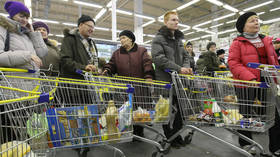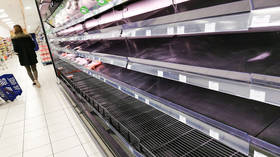Russians have crisis experience: Only 5% began stockpiling early for fear of coronavirus shortages

Some recent scenes from British and Australian supermarkets have been shocking, with people fighting in the aisles over toilet paper, and the like. With the experience of past crises, Russians are a bit more chilled.
Despite some signs of panic buying in recent days, a survey conducted last week indicates that most residents waited until the final moments to stock up on essentials for Covid-19 social distancing. The online questionnaire, conducted by Nielson and shown to news agency RIA Novosti, reveals that despite the coronavirus being all over the news since early February, only 5 percent of Russians had begun stockpiling.
The newly-published survey, conducted between March 2 and 8, revealed that 7 percent of Russians bought medicine, and 18 percent purchased disinfectants and personal hygiene products.
“Among those who bought food, the most popular goods were cereals (87%), canned goods (79%), pasta (75%), and coffee and tea (62%). As for hygiene products, most of the respondents purchased medical masks (76%), wet wipes with a disinfecting effect (67%), as well as antiseptic hand gels (65%)” the study notes.
Social media reports in the last week have indicated that the tide has slowly begun to change, with pictures of empty shelves becoming more common as the number of confirmed cases rise.
On Sunday, the Ministry of Industry and Trade assured Russians that grocery stores in Russia will not close, and have already begun to stock up on supplies. The president of the Association of Retail Companies (ACORT), Sergey Belyakov, also assured customers that “the shelves of the distribution centers are all filled.” This includes the most popular items being hoarded, such as buckwheat and toilet paper.
On Tuesday, President Vladimir Putin urged citizens not to buy too much produce. “The main thing is that people understand that [the situation] is stable so that they do not spend money on products that then have to be thrown away,” he said.
Also on rt.com Covid-19 pandemic could continue for 2 YEARS, German health expert warnsLast week, Russian daily Vedomosti reported that Russians had already begun to hoard supplies, in fear of the pandemic. According to the newspaper, website Goods.ru reported considerable increases in the sales of household chemicals, non-perishables, and water. Another popular retailer, Wildberries, reported a 241 percent increase in sales of wet wipes, compared to the same period last year.
As of late Tuesday night, the number of confirmed Covid-19 cases in Russia stands at 114, with the world total almost reaching 200,000.
If you like this story, share it with a friend!















